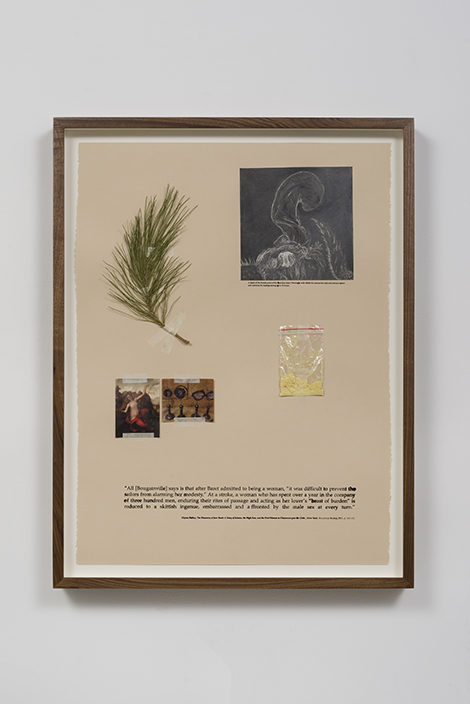One measure of a contemporary artist’s success is that he or she allows us to view the world, our history, or ourselves differently; Candice Lin is notable for doing all three. Her mixed-media work upsets epistemological meta-narratives, conflates binaries and revels in slippages. Distinctions such as those between male and female, life and death, and parasite and host are useless in her Weltanschauung. “You are a spacious fluid sac”, Lin’s new show at Francois Ghebaly, is a veritable cabinet of curiosities, but one with an abiding and meticulous sense of purpose—to upend the way we construct and consume knowledge.
The strongest works in the show are five collages, each containing a dried plant, a snippet of text, and a printed image. Female Penis/Beast of Burden (all works 2015) contains an image of a female neotrogla, a genus of barklice in which the female has a penis. The accompanying quote concerns Jeanne Baret, the first woman to circumnavigate the globe, doing so while dressed as a man; clearly, gender is a social construct. Animal within the Animal contrasts pregnancy with a fungus growing on a tarantula that causes it to produce antler-like protuberances. There is a sense of horror, of the alien, of the uneasy similarities between these situations of bodily inhabitation. Cannibalizing features the planarian, a flatworm that can regenerate body parts, as well as a quote from anthropologist Claude Levi-Strauss concerning criminals in society; it is clear that civilization struggles more than the natural world does when it comes to mending broken appendages.

Candice Lin, Cannibalizing Cultural Memory, 2015, Courtesy of the Artist and Ghebaly Gallery, Los Angeles
Image Credit: Jeff McLane
Tucked in a dark corner of the gallery is the eerie Recipe for Spontaneous Generation: Baby Mice, a glass jar with dead baby mice suspended in alcohol, complete with shamanistic elements such as copper pipe and dried wheat. With its companion piece Recipe for Spontaneous Generation: Baby Scorpions, it suggests pre-Enlightenment attempts to probe the boundaries of life and death. The fluid in which the once-living creatures are suspended is an apt metaphor for Lin’s practice, as it suggests sex, intermingling and immersion, and the futility of separation and hierarchy.
The centerpiece of the show due to its enormous size is the unsettling You are a parasite, a massive sculpture of the head of a Kafka-esque insect, its gaping maw revealing a pink rug, twinkling candles, tea and other offerings laid on the floor. The intersections of sex and violence and the human and the animal in this piece seek to collapse our own tenuous claims to supremacy and evolutionary progress.
Her summative work, 5 Kingdoms, is a handmade book of pages depicting the five classifications of living things; rather than strictly separating them, Lin celebrates overlap and connection. An apt way of understanding her work, then, is through Deleuze and Guattari’s rhizome; for her there are many pathways to knowledge, many entry and exit points and multiple truths. A fetus is a parasite, a woman is a man, and a dead animal is poised to come back to life.


